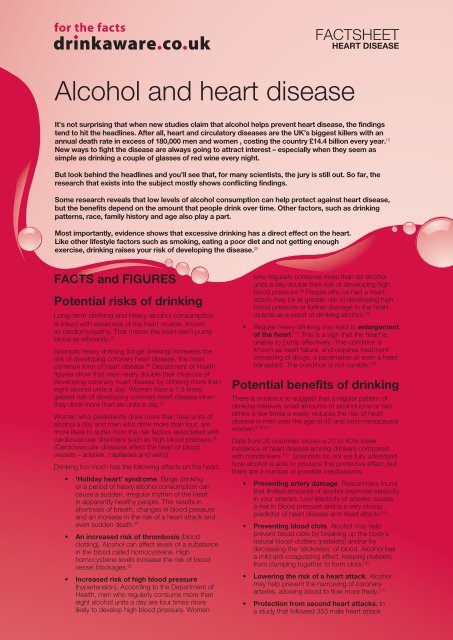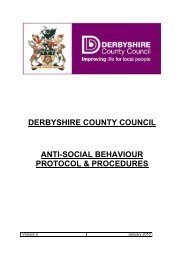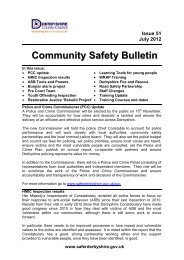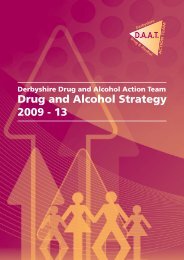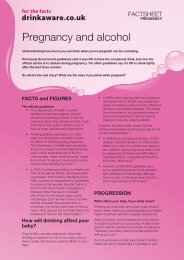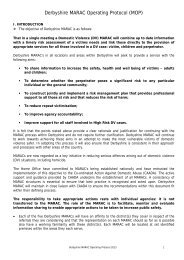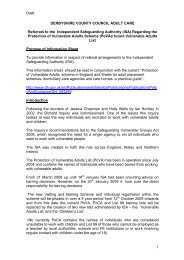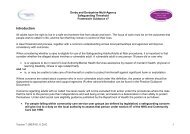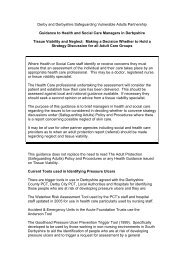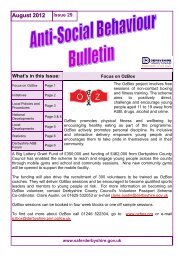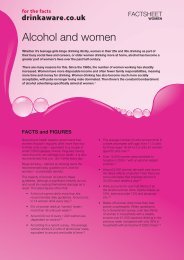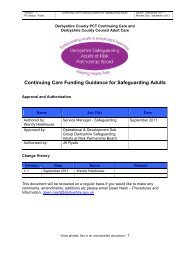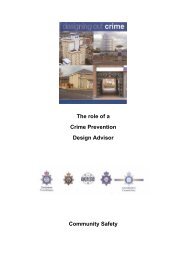Factsheet - alcohol and heart disease - Safer Derbyshire
Factsheet - alcohol and heart disease - Safer Derbyshire
Factsheet - alcohol and heart disease - Safer Derbyshire
Create successful ePaper yourself
Turn your PDF publications into a flip-book with our unique Google optimized e-Paper software.
FACTSHEET<br />
HEART DISEASE<br />
Alcohol <strong>and</strong> <strong>heart</strong> <strong>disease</strong><br />
It’s not surprising that when new studies claim that <strong>alcohol</strong> helps prevent <strong>heart</strong> <strong>disease</strong>, the findings<br />
tend to hit the headlines. After all, <strong>heart</strong> <strong>and</strong> circulatory <strong>disease</strong>s are the UK’s biggest killers with an<br />
annual death rate in excess of 180,000 men <strong>and</strong> women , costing the country £14.4 billion every year. (1)<br />
New ways to fight the <strong>disease</strong> are always going to attract interest – especially when they seem as<br />
simple as drinking a couple of glasses of red wine every night.<br />
But look behind the headlines <strong>and</strong> you’ll see that, for many scientists, the jury is still out. So far, the<br />
research that exists into the subject mostly shows conflicting findings.<br />
Some research reveals that low levels of <strong>alcohol</strong> consumption can help protect against <strong>heart</strong> <strong>disease</strong>,<br />
but the benefits depend on the amount that people drink over time. Other factors, such as drinking<br />
patterns, race, family history <strong>and</strong> age also play a part.<br />
Most importantly, evidence shows that excessive drinking has a direct effect on the <strong>heart</strong>.<br />
Like other lifestyle factors such as smoking, eating a poor diet <strong>and</strong> not getting enough<br />
exercise, drinking raises your risk of developing the <strong>disease</strong>. (2)<br />
FACTS <strong>and</strong> FIGURES<br />
Potential risks of drinking<br />
Long-term drinking <strong>and</strong> heavy <strong>alcohol</strong> consumption<br />
is linked with weakness of the <strong>heart</strong> muscle, known<br />
as cardiomyopathy. That means the <strong>heart</strong> can’t pump<br />
blood as efficiently. (3)<br />
Sporadic heavy drinking (binge drinking) increases the<br />
risk of developing coronary <strong>heart</strong> <strong>disease</strong>, the most<br />
common form of <strong>heart</strong> <strong>disease</strong>. (4) Department of Health<br />
figures show that men nearly double their chances of<br />
developing coronary <strong>heart</strong> <strong>disease</strong> by drinking more than<br />
eight <strong>alcohol</strong> units a day. Women have a 1.3 times<br />
greater risk of developing coronary <strong>heart</strong> <strong>disease</strong> when<br />
they drink more than six units a day. (5)<br />
Women who persistently drink more than thee units of<br />
<strong>alcohol</strong> a day <strong>and</strong> men who drink more than four, are<br />
more likely to suffer from the risk factors associated with<br />
cardiovascular disorders such as high blood pressure. (6)<br />
(Cardiovascular <strong>disease</strong>s affect the <strong>heart</strong> or blood<br />
vessels – arteries, capillaries <strong>and</strong> veins).<br />
Drinking too much has the following effects on the <strong>heart</strong>:<br />
• ‘Holiday <strong>heart</strong>’ syndrome. Binge drinking<br />
or a period of heavy <strong>alcohol</strong> consumption can<br />
cause a sudden, irregular rhythm of the <strong>heart</strong><br />
in apparently healthy people. This results in<br />
shortness of breath, changes in blood pressure<br />
<strong>and</strong> an increase in the risk of a <strong>heart</strong> attack <strong>and</strong><br />
even sudden death. (7)<br />
• An increased risk of thrombosis (blood<br />
clotting). Alcohol can affect levels of a substance<br />
in the blood called homocysteine. High<br />
homocysteine levels increase the risk of blood<br />
vessel blockages. (8)<br />
• Increased risk of high blood pressure<br />
(hypertension). According to the Department of<br />
Health, men who regularly consume more than<br />
eight <strong>alcohol</strong> units a day are four times more<br />
likely to develop high blood pressure. Women<br />
who regularly consume more than six <strong>alcohol</strong><br />
units a day double their risk of developing high<br />
blood pressure. (9) People who’ve had a <strong>heart</strong><br />
attack may be at greater risk of developing high<br />
blood pressure or further damage to the <strong>heart</strong><br />
muscle as a result of drinking <strong>alcohol</strong>. (10)<br />
• Regular heavy drinking may lead to enlargement<br />
of the <strong>heart</strong>. (11) This is a sign that the <strong>heart</strong> is<br />
unable to pump effectively. This condition is<br />
known as <strong>heart</strong> failure, <strong>and</strong> requires treatment<br />
consisting of drugs, a pacemaker or even a <strong>heart</strong><br />
transplant. The condition is not curable. (12)<br />
Potential benefits of drinking<br />
There is evidence to suggest that a regular pattern of<br />
drinking relatively small amounts of <strong>alcohol</strong> (one or two<br />
drinks a few times a week) reduces the risk of <strong>heart</strong><br />
<strong>disease</strong> in men over the age of 40 <strong>and</strong> post-menopausal<br />
women. (13)(14)<br />
Data from 20 countries shows a 20 to 40% lower<br />
incidence of <strong>heart</strong> <strong>disease</strong> among drinkers compared<br />
with nondrinkers. (15) Scientists do not yet fully uderst<strong>and</strong><br />
how <strong>alcohol</strong> is able to produce this protective effect, but<br />
there are a number of possible mechanisms:<br />
• Preventing artery damage. Researchers found<br />
that limited amounts of <strong>alcohol</strong> improves elasticity<br />
in your arteries. Low elasticity of arteries causes<br />
a rise in blood pressure <strong>and</strong> is a very strong<br />
predictor of <strong>heart</strong> <strong>disease</strong> <strong>and</strong> <strong>heart</strong> attack. (15)<br />
• Preventing blood clots. Alcohol may help<br />
prevent blood clots by breaking up the body’s<br />
natural blood-clotters (platelets) <strong>and</strong>/or by<br />
decreasing the ‘stickiness’ of blood. Alcohol has<br />
a mild anti-coagulating effect, keeping platelets<br />
from clumping together to form clots. (16)<br />
• Lowering the risk of a <strong>heart</strong> attack. Alcohol<br />
may help prevent the narrowing of coronary<br />
arteries, allowing blood to flow more freely. (17)<br />
• Protection from second <strong>heart</strong> attacks. In<br />
a study that followed 353 male <strong>heart</strong> attack
FACTSHEET<br />
HEART DISEASE<br />
survivors over a period of four years, researchers<br />
found men who consumed two to four glasses<br />
of wine each day were less likely to suffer from a<br />
second <strong>heart</strong> attack than men who didn’t drink. (18)<br />
Red wine<br />
Some studies show that wine, particularly red wine,<br />
can protect against <strong>heart</strong> <strong>disease</strong> more effectively than<br />
beer or other <strong>alcohol</strong> at equivalent levels of consumption. (19)<br />
Studies suggest that this is because red wine contains<br />
plant chemicals called procyanidins, which help protect<br />
the <strong>heart</strong> (20) <strong>and</strong> are also found in cranberry juice. (21)<br />
However, evidence shows that people who drink<br />
wine over other <strong>alcohol</strong>ic beverages also tend to live<br />
healthier lives. For example, drinkers who prefer wine<br />
tend to smoke less <strong>and</strong> drink less <strong>and</strong> have a healthier<br />
diet than those who prefer beer or spirits. (22) So these<br />
other factors rather than the red wine may in fact be<br />
responsible for the better health outcomes.<br />
PROGRESSION<br />
Heart <strong>disease</strong> is caused by a gradual build up of fatty<br />
deposits on the walls of your coronary arteries, which<br />
deliver blood to the <strong>heart</strong>. This causes the artery to<br />
narrow, <strong>and</strong> makes it harder for it to supply your <strong>heart</strong><br />
muscle with blood <strong>and</strong> oxygen. (23) To function normally,<br />
the muscle tissue that constitutes the bulk of the <strong>heart</strong><br />
requires a constant supply of oxygen-containing blood.<br />
Blocking of the arteries leads to coronary <strong>heart</strong> <strong>disease</strong>,<br />
which may result in angina (<strong>heart</strong>-related chest pain) <strong>and</strong><br />
eventually to sudden death from a <strong>heart</strong> attack.<br />
Heart attacks, the most common serious manifestation<br />
of coronary <strong>heart</strong> <strong>disease</strong>, are generally triggered by a<br />
blood clot forming within a constricted coronary artery,<br />
obstructing blood flow <strong>and</strong> depriving a portion of the<br />
<strong>heart</strong> muscle of oxygen. As a result, the <strong>heart</strong> can’t<br />
pump properly which can cause permanent disability or<br />
death, either immediately or through medical<br />
complications. (24)<br />
ADVICE <strong>and</strong> GETTING HELP<br />
Importantly, doctors do not recommend that people<br />
who don’t usually drink <strong>alcohol</strong> start doing so to protect<br />
themselves against <strong>heart</strong> <strong>disease</strong> – the evidence for the<br />
benefits does not justify this.<br />
The trade-offs between risks <strong>and</strong> benefits can be<br />
exemplified by the fact that <strong>alcohol</strong>’s anti-clotting ability,<br />
potentially protective against <strong>heart</strong> attack, may increase<br />
the risk of haemorrhagic stroke (when a blood vessel<br />
bursts inside the brain), or bleeding within the brain. (25)<br />
There are safer options to avoid <strong>heart</strong> <strong>disease</strong>. To keep<br />
your <strong>heart</strong> healthy, the British Heart Foundation (BHF)<br />
advises:<br />
• taking exercise<br />
• eating a healthy diet<br />
• being aware of dangers such as smoking,<br />
drinking, high blood pressure <strong>and</strong> stress.<br />
British Heart Foundation: 0300 330 3311.<br />
References<br />
1 Allender, S, Peto, V, Scarborough, P, Kaur, A & Rayner, M 2008, Coronary <strong>heart</strong><br />
<strong>disease</strong> statistics, British Heart Foundation, London. http://www.<strong>heart</strong>stats.org/<br />
datapage.asp?id=713<br />
2 Gunzerath, L, Faden, V, Zakhari, S & Warren, K 2004, ‘National Institute on<br />
Alcohol Abuse <strong>and</strong> Alcoholism report on moderate drinking’, Alcoholism: Clinical<br />
<strong>and</strong> Experimental Research 28, pp. 829-847.<br />
3 Urbano-Marquez, A, Estruch, R, Navarro-Lopez, F, Grau, J & Rubin, E 1989,<br />
‘The effects of <strong>alcohol</strong>ism on the skeletal <strong>and</strong> cardiac muscle’, New Engl<strong>and</strong><br />
Journal of Medicine 320, pp. 409-415.<br />
4 The Academy of Medical Sciences 2004, ‘Calling time: The nation’s drink as a<br />
major health issue’, March.<br />
5 Department of Health, 2007, Safe. Sensible. Social. The next steps<br />
in the National Alcohol Strategy, 5 June, http://www.dh.gov.uk/en/<br />
Publications<strong>and</strong>statistics/Publications/PublicationsPolicyAndGuidance/<br />
DH_075218<br />
6 British Heart Foundation, Alcohol <strong>and</strong> <strong>heart</strong> <strong>disease</strong>, http://www.bhf.org.uk/<br />
keeping_your_<strong>heart</strong>_healthy/healthy_eating/<strong>alcohol</strong>_advice.aspx<br />
7 Ettinger, P, Wu, C, de la Cruz, C et al 1978, ‘Arrhythmias <strong>and</strong> the “Holiday<br />
Heart”: Alcohol-associated cardiac rhythm disorders’, American Heart Journal,<br />
95(5), pp.555-62.<br />
8 Mckee, M & Britton, A 1998, ‘The positive relationship between <strong>alcohol</strong> <strong>and</strong><br />
<strong>heart</strong> <strong>disease</strong> in eastern Europe: Potential physiological mechanisms’, Journal of<br />
the Royal Society of Medicine, 91(8), pp. 402-407.<br />
9 Department of Health, 2007, Safe. Sensible. Social. The next steps<br />
in the National Alcohol Strategy, 5 June, http://www.dh.gov.uk/en/<br />
Publications<strong>and</strong>statistics/Publications/PublicationsPolicyAndGuidance/<br />
DH_075218<br />
10 ‘Alcohol & Heart Disease’, http://yourtotalhealth.ivillage.com/<strong>alcohol</strong>-<strong>heart</strong><strong>disease</strong>.html?pageNum=4<br />
11 British Heart Foundation, Alcohol <strong>and</strong> <strong>heart</strong> <strong>disease</strong>, http://www.bhf.org.uk/<br />
keeping_your_<strong>heart</strong>_healthy/healthy_eating/<strong>alcohol</strong>_advice.aspx<br />
12 The Cardiomyopathy Association, http://www.cardiomyopathy.org/index.<br />
php?id=48<br />
13 Baer, D, Judd, JT, Clevidence, B, Muesing, R, Campbell, W, Brown, E & Taylor,<br />
P 2002, ‘Moderate <strong>alcohol</strong> consumption lowers risk factors for cardiovascular<br />
<strong>disease</strong> in postmenopausal women fed a controlled diet’, American Journal<br />
Clinical Nutrition, vol. 75, no. 3, pp. 593-599.<br />
14 Rimm, E, Giovannucci, E, Willett, W, Colditz, G, Ascherio, A, Rosner, B &<br />
Stampfer, M 1991, ‘Prospective study of <strong>alcohol</strong> consumption <strong>and</strong> risk of<br />
coronary <strong>disease</strong> in men’, Lancet, vol. 338, pp. 464-468.<br />
15 National Institute on Alcohol Abuse <strong>and</strong> Alcoholism 1999, Alcohol Alert, no. 45,<br />
October, http://pubs.niaaa.nih.gov/publications/aa45.htm<br />
16 Zimlichman, R, ‘Arterial stiffness in health <strong>and</strong> in <strong>disease</strong>’, American Journal of<br />
Hypertension, vol. 17, issue 5, p. S139.<br />
17 Rubin, R 1999, ‘Effect of ethanol on platelet function’, Alcohol: Clinical <strong>and</strong><br />
Experimental Research 23(6), pp. 1114-1118.<br />
18 Mukamal, K, Chiuve, S & Rimm, E 2006, ‘Alcohol consumption <strong>and</strong> risk for<br />
coronary <strong>heart</strong> <strong>disease</strong> in men with healthy lifestyles’, Archives of Internal<br />
Medicine, vol. 166, no.19, pp. 2145-2150.<br />
19 Emeson, E, Manaves, V, Singer, T et al 1995, ‘Chronic <strong>alcohol</strong> feeding inhibits<br />
atherogenesis in C57BL/6 hyperlipidemic mice’, American Journal of Pathology<br />
147(6), pp. 1749-1758.<br />
20 de Lorgeril, M et al 2002, report published in Circulation: Journal of the American<br />
Heart Association, 2002, reported by McCook, A. ‘Light drinking may lower 2nd<br />
<strong>heart</strong> attack risk’. Reuters (September 3, 2002).<br />
21 Corder, R, Mullen, W et al 2006, ‘Oenology: Red wine procyanidins <strong>and</strong> vascular<br />
health’, Nature, vol. 444, no. 7119, p.566.<br />
22 Hammerstone, J, Lazarus, S & Schmitz, H 2000, ‘Procyanidin content <strong>and</strong><br />
variation in some commonly consumed foods’, Journal of Nutrition 130, pp.<br />
2086-2092.<br />
23 Ruf, J-C, Berger, J-L & Renaud, S 1995, ‘Platelet rebound effect on <strong>alcohol</strong><br />
withdrawal <strong>and</strong> wine drinking in rats: Relation to tannins <strong>and</strong> lipid peroxidation’,<br />
Arteriosclerosis, Thrombosis <strong>and</strong> Vascular Biology 15(1), pp. 140-144.<br />
24 Stocker, R & O’Halloran, R 2004, ‘De<strong>alcohol</strong>ised red wine decreases<br />
atherosclerosis in apolipoprotein E gene–deficient mice independently of<br />
inhibition of lipid peroxidation in the artery wall’, American Journal of Clinical<br />
Nutrition, vol. 79, no. 1, pp. 123-130, January.<br />
25 British Heart Foundation, Cardiovascular Disease, http://www.bhf.org.uk/<br />
living_with_a_<strong>heart</strong>_condition/underst<strong>and</strong>ing_<strong>heart</strong>_conditions/types_of_<strong>heart</strong>_<br />
conditions/cardiovascular_<strong>disease</strong>.aspx<br />
26 National Institute on Alcohol Abuse <strong>and</strong> Alcoholism 1999, Alcohol Alert, no. 45,<br />
October, http://pubs.niaaa.nih.gov/publications/aa45.htm<br />
Contents approved by Drinkaware Chief Medical Adviser, Prof. Paul Wallace BSc<br />
(Hons), MSc, MBBS, FRCGP, FFPHM<br />
Drinkaware<br />
7-10 Ch<strong>and</strong>os Street<br />
London<br />
W1G 9DQ<br />
0207 307 7450<br />
The Drinkaware Trust<br />
Registered in Engl<strong>and</strong> <strong>and</strong> Wales No. 4547974<br />
A company limited by guarantee<br />
Registered Charity No. 1094586


